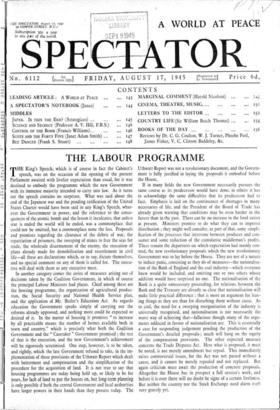THE LABOUR PROGRAMME T HE King's Speech, which is of course
in fact the Cabinet's speech, was on the occasion of the opening of the present Parliament awaited with livelier expectation than usual, for it was destined to embody the programme which the new Government with its immense majority intended to carry into law. As it turns out the speech contains no surprises.. What was said about the end of the Japanese war and the pending ratification of the United States Charter would have been said in any King's Speech, what- ever the Government in power, and the reference to the conse- quences of the atomic bomb and the lesson it inculcates, that unless war is ended the world will be ended, was a commonplace that could not be omitted, but a commonplace none the less. Proposals and promises regarding the clearance of the debris of war, the repatriation of prisoners, the sweeping of mines to free the seas for trade, the wholesale disarmament of the enemy, the execution of plans already made for demobilisation and resettlement in civil life—all these are declarations which, so to say, dictate themselves, and no special comment on any of them is called for. The execu- tive will deal with them as any executive must.
In another category comes the series of measures arising out of decisions taken by the Coalition Government, in which of course the principal Labour Ministers had places. Chief among these are the housing programme, the organisation of agricultural produc- tion, the Social Security and National Health Service plan, and the application of Mr. Butler's Education Act. As regards education the Government speaks simply of carrying out the reforms already approved, and nothing more could be expected or desired of it. In the matter of housing it promises " to increase by all practicable means the number of homes available both in town and country," which is precisely what both the Coalition Government and the " Caretaker " Government promised ; the test of that is the execution, and the new Government's achievement will be rigorously scrutinised. One step, however, is to be taken, and rightly, which the late Government refused to take, in the im- plementation of those provisions of the Uthwatt Report which dealt with betterment and compensation and the simplification of the procedure for the acquisition of land. It is not true to say that housing programmes are today being held up, or likely to be for years, for lack of land to put the houses on, but long-term planning is only, possible if both the central Government and local authorities have larger powers in their hands than they possess today. The Uthwatt Report was not a revolutionary document, and the Govern- ment is fully justified in laying the proposals it embodied before the House.
If in many fields the new Government necessarily pursues the same course as its predecessor would have done, in others it has to acknowledge the same difficulties that its predecessor had to face. Emphasis is laid on the continuance of shortages in many necessaries of life, and the President of the Board of Trade has already given warning that conditions may be even harder in the future than in the past. There can be no increase in the food ration at present. Ministers promise to do what they can to improve distribution ; they might well consider, as part of that, some simpli- fication of the processes that intervene between producer and con- sumer and some reduction of the cumulative middleman's profits. There remain the departures on which expectation had mainly cen- tred, the new revolutionary proposals which the new revolutionary Government was to lay before the House. They are not of a nature to induce panic, consisting as they do of measures—the nationalisa- tion of the Bank of England and the coal industry—which everyone knew would be included, and omitting one or two others whose addition would have surprised no one. The nationalisation of the Bank is a quite unnecessary proceeding, for relations. between the Bank and the Treasury are already so close that nationalisation will make little practical difference ; that is more an argument for leav- ing things as they are than for disturbing them without cause. As to coal, the need for a sweeping reorganisation of the industry is universally recognised, and nationalisation is not necessarily the worst way of achieving that—fallacious though many of the argu- ments adduced in favour of nationalisation are. This is essentially a case for suspending judgement pending the production of the Government's detailed proposals.; much will hang on the equity of the compensation provisions. The other expected measure concerns the Trade Disputes Act. Here what is proposed, it must be noted, is not merely amendment but repeal. This immediately raises controversial issues, for the Act was not passed without a cause, and it cannot be merely repealed and not replaced. But again criticism must await the production of concrete proposals. Altogether the House has in prospect a full session's work, and before it is over there will no doubt be signs of a certain liveliness. But neither the country nor the Stock Exchange need alarm itself very gravely yet.


























